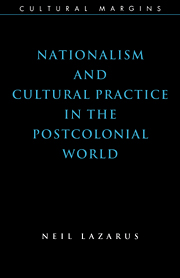Book contents
- Frontmatter
- Contents
- Acknowledgments
- Introduction: hating tradition properly
- 1 Modernity, globalization, and the “West”
- 2 Disavowing decolonization: nationalism, intellectuals, and the question of representation in postcolonial theory
- 3 Cricket, modernism, national culture: the case of C. L. R. James
- 4 “Unsystematic fingers at the conditions of the times”: Af ropop and the paradoxes of imperialism
- Notes
- Bibliography
- Index
- Cultural Margins
2 - Disavowing decolonization: nationalism, intellectuals, and the question of representation in postcolonial theory
Published online by Cambridge University Press: 02 December 2009
- Frontmatter
- Contents
- Acknowledgments
- Introduction: hating tradition properly
- 1 Modernity, globalization, and the “West”
- 2 Disavowing decolonization: nationalism, intellectuals, and the question of representation in postcolonial theory
- 3 Cricket, modernism, national culture: the case of C. L. R. James
- 4 “Unsystematic fingers at the conditions of the times”: Af ropop and the paradoxes of imperialism
- Notes
- Bibliography
- Index
- Cultural Margins
Summary
Over the course of the past fifteen years or so, and – for very obvious geopolitical reasons – especially since 1989, there has been something of an obsessive return to the subjects of nationalism and the nationstate in Western-based cultural, historical, and social scientific scholarship. These subjects, which – as the mere mention of the names of Ernest Renan and John Stuart Mill might be sufficient to indicate – were already important to European thought in the latter half of the nineteenth century, had remained so well into the twentieth. Yet their prominence diminished quite sharply in the 1970s and early 1980s, as scholarly interest turned away from the nation toward the analysis and championing of other forms of political community (whether sub- or transnational). But contemporary developments – in Eastern Europe and the former Soviet Union, in India, in southern and central Africa, and elsewhere – have had the effect of reversing this recent trajectory and directing scholarly attention once again to the “national question.”
The scope and suddenness of these contemporary developments – the collapse of historical communism, the end of apartheid, the cataclysm in Rwanda, etc. – were nowhere predicted and tended to catch everyone unawares. Despite this – or precisely because of it, perhaps – most of the contemporary studies have continued to be pitched quite unreflexively upon the terrain of the unambiguously First Worldist interpretation of nationalism that has been predominant since at least 1918. Nationalism, that is to say, has been seen as constituting a kind of return of the repressed.
- Type
- Chapter
- Information
- Nationalism and Cultural Practice in the Postcolonial World , pp. 68 - 143Publisher: Cambridge University PressPrint publication year: 1999
- 11
- Cited by

